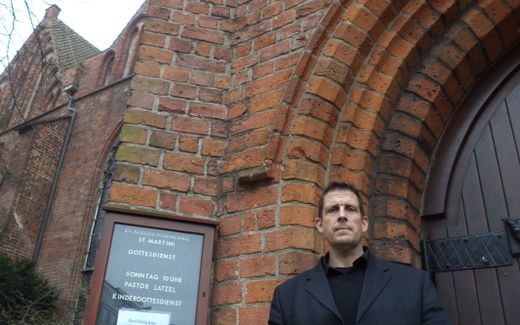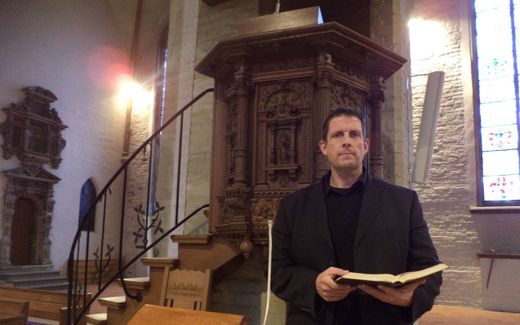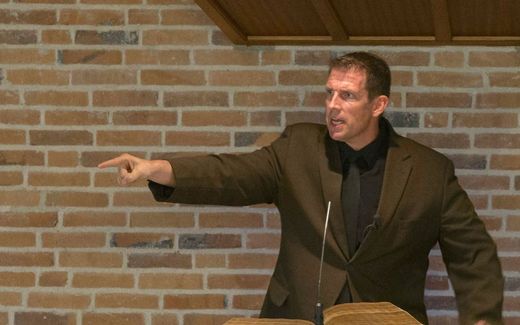Why it is strange that Latzel’s court case has to be re-done
27-08-2024
Central Europe
Addy de Jong, RD

Mr Olaf Latzel in the courtroom in Bremen February 2023. Photo ANP, Eckhard Stengel
Central Europe
Olaf Latzel was acquitted in 2022. But this Wednesday, he is on trial again. Is this case against the German pastor beginning to resemble a political trial? Anyhow, the resumption of this long-running case raises many questions.
Friday morning, 20 May 2022. Relief shows on the face of the well-known Bremen pastor Olaf Latzel (56), his wife, daughter and some congregation members present. Acquitted! Finally freed from the oppressive burden of being a popular inciter.
Yes, Judge Hendrik Göhner ruled, from a social point of view, that the statements Mr Latzel made at a marriage seminar in October 2019 were “more than disconcerting”. Latzel then spoke of homosexuality as a ‘degenerative form of society”, that he spoke of part of the gay lobby as “those criminals of Christopher Street Day”, and used words like “gender filth” that ‘signifies an attack on God’s order of creation’ and is “profoundly diabolical and satanic”; all this, Göhner said, certainly did not contribute to a climate “in which all people get along well”.
However, in November 2020, the Amtsgericht Bremen (the district court) found the preacher guilty of widespread incitement and sentenced him to a fine of 8100 euros; this lower court missed the point. No, says Göhner in May 2022 on behalf of a higher court, the Landgericht Bremen, that Latzel intentionally wanted to insult gays in 2019 can absolutely not be proven. Therefore: acquittal. And the earlier conviction was annulled.
Disappointment
Unfortunately, the joy of Latzel and his followers was only short-lived. Just like the pastor at the time appealed against the conviction by the Amtsgericht, the Bremen public prosecutor’s office appealed against the acquittal by the Landesgericht. As a result, the Oberlandesgericht –which did not re-examine the substance of the case but only checked it for possible procedural errors or shortcomings– annulled this acquittal on 23 February 2023, to the great disappointment of the pastor of the Bremen Martini church.
The reason: the Landesgericht Bremen had given incomplete reasons for the acquittal decision. After all, Latzel’s allegedly incendiary statements had come from a lecture lasting three-quarters of an hour. The Landgericht had only quoted excerpts from it in its reasoning. According to the Oberlandesgericht judges, the pastor’s speech should have been included in its entirety in the grounds of the judgment. Perhaps passages that the Landgericht had omitted could still have referenced criminal incitement to hatred...
Apologies
The undoing of the acquittal immediately provoked strong reactions in Germany a year and a half ago. Such as that of the president of the Christian Police Federation, Hamburg Detective Holger Clas. According to him, many police officers shook their heads in amazement at hearing the court case against Rev. Latzel. “For three years, a Protestant pastor has been criminally prosecuted who has apologised several times for his statements,” Clas told the German news agency IDEA, dismayed.
The police chief pointed out that many criminal cases are dismissed in his country and that serious criminals are sometimes released from pre-trial detention because criminal cases cannot be heard in time. “With such use of resources by the judiciary (meaning the Oberlandesgericht, AdJ), the impression can quickly arise that external political considerations are playing a role in the background,” he concluded. “The judiciary does itself no favours with this.”
Similarly, Latzel’s lawyer, Dr Sacha Böttner, expressed himself in the courtroom immediately after the verdict in front of journalists. “We have the impression that this is a political trial,” Böttner explained. “Let’s put it this way: legal reasons can no longer explain why, three years later, a pastor is dragged into court for the fourth time for some statements for which he has repeatedly apologised. And the reasoning of the judges of the Oberlandesgericht Bremen makes it difficult to believe in their impartiality.”
Philosophy
Firm language. Are judges being biased? Is this a political process? One should always be careful with such terms. They evoke, in their most extreme form, memories of the show trial of Kamenev and Zinoviev, prominent communists sentenced to death in 1936 at the hands of ‘comrade’ Stalin in the then Soviet Union. Or of unsavoury show trials in Nazi Germany.
And even if someone claims that he is not referring to that, of course, but only to a situation where a judge allows his own philosophy of life and political views or public opinion to weigh in his verdict, he should be careful. Such a person, before he knows it, undermines any public trust in the judiciary as a whole.
That danger was also pointed out by Ybo Buruma, a professor of criminal law and criminal procedure in Nijmegen and a justice of the Supreme Court of the Netherlands, when he commented in the Dutch Law Journal in 2016 on the increasingly familiar term “political process” in public debate. Beware, he wrote in so many words, of simply conflating—also in imaging—the terms “politics” and “jurisprudence.”
The noted jurist argued that those two areas of life differ, such as night and day. Politicians depend on the judgement of the public. Judges never simply interpret individual or political opinions in their rulings, but they craftily apply legal provisions to concrete situations, Buruma argued. In mathematics, is one plus one always two? And doesn’t that outcome depend on public opinion? Well, so it is with a court ruling.
Suggestions
Nevertheless, it is understandable that the Oberlandesgericht’s verdict leads to the suggestions above and speculations. After all, the May 2023 ruling raises questions, to say the least. Yes, indeed, in the written justification for the acquittal, the Landgericht ‘only’ quotes four statements made by Latzel in the disputed marriage seminar that might be punishable. But surely that does not mean that this court would not have taken note of the rest of the (three-quarter-hour) seminar.
Those who followed the four days of hearings in May 2022 know that the opposite is true. On the first day, Monday 9 May, the court had already spent at least 105 minutes listening to the seminar’s audio recording in full. But like the Amtsgericht that sentenced Latzel to his fine earlier, the Landesgericht thus found no more than four sentences in the Bremen preacher’s long lecture that could be considered potentially incendiary.
Therefore, the Oberlandesgericht’s argument that Latzel’s acquittal is invalid because its justification did not include the text of the entire seminar, the legally trained IDEA journalist David Wengenroth last year called “bizarre reasoning. The decision by the judges of the Oberlandesgericht Bremen virtually turns the “in case of doubt pick the side of the accused” principle on its head. According to this logic, any acquittal can be overturned if there is even a vague suspicion that something incriminating was overlooked in a lower court.”
In the commentary Wengenroth wrote for IDEA last year, he pointed out another absurdity. For did not case law from the Bundesgerichtshof, the highest court in Germany, stipulate precisely that courts may not give extensive reasons for judgments? That provision is apparently wholly ignored by the Oberlandesgericht. If the Landgericht had typed out the entire marriage seminar in May 2022, the judgment would probably have been 90 pages thick. Wengenroth: “And that without any substantive added value.”
This article was translated by CNE.news and published by the Dutch daily Reformatorisch Dagblad on August 24, 2024
Related Articles









